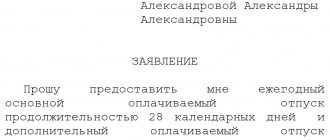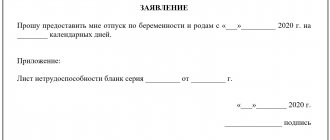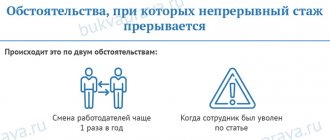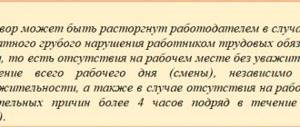By law, the first vacation after getting a job can be taken after six months. This rule applies to almost all groups of workers, but there are exceptions that allow you to take a vacation earlier.
Some organizations introduce their own rules for vacation periods in the first year of work, but they must be consistent with the norms of the Labor Code and not contradict it.
The employer is obliged not only to provide the new employee with vacation within the specified time frame, but also not to violate the already drawn up priority schedule for those who were previously employed. In addition, it is extremely important to maintain a rational balance between the desires of the employee and the production capabilities of the organization. Taking everything into account and not breaking the law is the main responsibility of the head of the organization.
Vacation from a new job
The right to receive annual paid rest is assigned to every worker, regardless of profession, length of service and salary level. In accordance with the Labor Code of the Russian Federation, the minimum duration of vacation periods is 28 days per year, which when divided by 12 months forms a figure of 2.33. For each month worked, a person has the right to more than two paid days of rest.
By concluding an employment contract with a new employer, an employee automatically receives all social guarantees listed in the legislative norms of the Russian Federation. His contract specifies all the vacation periods due to him, which may include:
- Regular or additional period.
- Extended rest, which is required by a number of professions.
- Days provided by the employer in excess of the specified norms on his own initiative.
But you can’t take advantage of the right to take paid vacation days right away. This is due to the fact that the employee has not yet actually earned it and, although subsequent rest may be provided in advance, a certain limit of trust must still be created before the employee can fully rest.
When is the best time to go on vacation?
According to experts, vacation is best used when employers are less looking for staff. When the market is calm, this is January and April.
However, vacation in January is considered one of the most unprofitable months in terms of receiving vacation pay. The fact is that due to the New Year holidays, a working day in January is very expensive; the amount of vacation pay is calculated from the average salary, at which a vacation day becomes much cheaper than a working day in the first month of the year. Experts recommend that Russians go on vacation during the “non-holiday” months.
Article on the topic
How to prepare for an important conversation with your boss?
Sequence of provision
Employment during the calendar year entails a number of other inconveniences for the employer. So a common question among employers is determining the priority of what to do if a vacation schedule has already been drawn up.
A priority schedule must be drawn up by each organization within strictly established time frames. According to Article 123 of the Labor Code of the Russian Federation, this document is always drawn up before mid-December of the current year. All persons working in the organization must be included in it, indicating the start date of the vacation and its duration. Since the law does not prohibit dividing a vacation into component parts, such divisions can be prescribed in the schedule in advance. When a new person arrives, it is inappropriate to redo an already approved document, although this is not prohibited by law. But it’s easier to coordinate the time of care individually. To do this, a discussion between the parties to the labor relationship takes place at a time convenient for both. And the rest itself is provided at the request of the employee.
What happens to unused vacation days in the event of dismissal?
If you leave the company, but still have unused vacation, you have the right to count on monetary compensation for all accumulated vacation days.
In order not to work the 2 weeks required by law upon dismissal, you can take out unused vacation, but this issue must be agreed upon with your manager. “Upon a written application, an employee may be granted leave (unused vacation days) followed by dismissal (except for cases of dismissal for guilty actions). In this case, the day of dismissal is considered the last day of vacation,” explains Yulia Chashina, HR director of the recruiting portal Superjob.ru.
Required experience
Article 122 of the Labor Code of the Russian Federation regulates the procedure for granting vacation days in the first working year.
In accordance with its norms, an employee can obtain the legal right to rest only after six months of work. The specified six months are counted in calendar terms and imply that the person was hired and did not terminate the contract during this time. Not only days of actual work are taken into account, but also weekends, holidays, as well as days of illness or business trips. An exception to the general calculation rule may be days taken without pay if their total number exceeded the legally permissible threshold of 14 days. Missed days are also excluded from the total length of service and delay the right to apply for a vacation period.
After six months, the employee can apply to the management of the organization to request rest days. But not in all cases his request will be granted immediately and in full. Leave 6 months after employment may be delayed if:
- There is a production need to fulfill certain labor indicators at this stage.
- The waiting list does not allow a person to go on vacation.
Management cannot refuse paid days and is still obliged to send the employee on vacation during the year, but he is quite capable of adjusting the time off.
Duration of the first rest
So, we already know that granting leave after 6 months of work is a completely feasible procedure. How many days are you allowed to take time off in this case? The standard annual vacation from work, paid by the employer and guaranteed by the state, lasts at least 28 days (Article 115 of the Labor Code of the Russian Federation). The Labor Code allows you to divide the first vacation after 6 months: the employee chooses how many days to rest. But only so that one of its parts lasts at least 14 days. Conclusion: after six months of work, a new employee has the right to receive a rest period of two weeks. But it is not forbidden to approve a period that will cover less or more than 14 days. Less - if the employee indicated so in the application, and more - by agreement. The legislation does not prohibit providing the days of paid rest required by law in advance.
True, questions arise regarding the payment of vacation pay in this case, since the vacation is paid for by the employer. What if a person decides to quit and does not complete the calendar year, having already taken 28 days off work. In this case, when making calculations, management has the right to withhold overpaid vacation pay, but only if the person agrees to this. True, with a limitation: the amount of all deductions from wages does not exceed 20% of its size (Article 138 of the Labor Code of the Russian Federation). If the employee is against it, it is worth trying to retain the overpaid vacation pay in court, but in most cases the court refuses the employer. It is clear from existing judicial practice: judges do not believe that a person is obliged to compensate for excess amounts if the reason for issuing a larger amount is not a counting error or his guilty actions (ruling of the Supreme Court of the Russian Federation dated March 14, 2014 No. 19-KG13-18, appeal rulings of the Nizhny Novgorod Regional Court dated 03/14/2017 in case No. 33-2578/2017, Supreme Court of the Republic of Bashkortostan dated 11/09/2016 in case No. 33-22500/2016).
Duration of vacation period
Article 122 regulates the issues not only of when the first leave can be taken under the Labor Code, but also to what extent it can be taken. In accordance with the established rules, after six months of continuous work, an employee has the right to request the full period due to him for the year. But how much the employer will approve, taking into account all production factors, is a separate nuance. Many organizations impose some internal restrictions to avoid giving new hires all the rest at once. Such barriers are related to payment rules. When going on vacation, the employer is obliged to pay for the days provided, however, no one can prohibit a person from leaving immediately after it ends. It is illegal to force an employee to work, but you can return no more than 20% of the accrued settlement amounts, and they are close to zero, subject to dismissal after rest. Thus, a debt may arise, which is extremely problematic to collect from the dismissed person if he does not agree to put money in the cash register voluntarily.
However, organizations cannot legally ban the provision of all leave after six months, so they often refer to other conditions, for example, a busy schedule or impossibility for technical reasons.
If you had to take sick leave instead of vacation
Sometimes an employee presents a sick leave certificate before going on vacation. This is considered as a reason to postpone the holiday to another time. Such rules are reflected in Article 124 of the labor law. It happens that an employee manages to recover before going on vacation, but his payments are not calculated.
The rules for this are reflected in the same article. If a person gets sick or injured while on vacation, he or she extends or postpones the vacation. Similar provisions apply to cases when an employee does not have time to recover or falls ill before rest.
It is worth considering that Article 423 of the Labor Code reflects the rule according to which acts adopted in Soviet times can be applied today. The main condition is that the documents do not contradict the current provisions of the law.
Article 18 of the Rules on regular and additional vacations, which were approved by the People's Commissariat of Labor of the USSR under No. 169, states that if unforeseen circumstances arise before the start of the vacation, then a new start date for the vacation can be set.
It will be necessary to reach an agreement on this issue with the company management. The labor law reflects similar provisions on the transfer of vacations. If sick leave is closed during a vacation that is not rescheduled due to lack of agreement with the company, the employee can use the powers established in the Labor Code. This means that the leave will be extended for the period during which the person was incapacitated. The transfer of rest to another period can be used.
Vacation earlier than six months
Not all categories of employees are required to work for six months; some can legally go on vacation before the expiration of this period. Only those employees who are listed in Part 3 of Article 122 of the Labor Code of the Russian Federation can go on vacation earlier. The employees specified in it cannot be denied the exercise of this right; they can go on vacation, even if they have worked in the organization for only a few weeks.
In addition to the mandatory conditions, there is a rule according to which the employer can himself issue vacation periods ahead of schedule. To do this, you just need to coordinate your request with management and get permission to leave. The duration of such premature segments is also negotiated individually, and the required period is prescribed in the order for the organization.
Categories of workers
The following can go on vacation before the six months worked:
- Pregnant women before going on maternity leave.
- Employees who gave birth immediately after the end of maternity leave according to BiR and before the start of maternity leave for a child up to three years old.
- Minors until they reach 18 years of age.
- Employees who adopted a child under three months of age.
Article 122 stipulates that other rules may be applied if they are established at the federal level. But there is another common category that does not have a time limit for taking paid annual leave - these are part-time workers. For those working part-time, internal or external, vacation periods are always issued along with the days that are issued at the main place of work. This is an obligation of all employers who have part-time employees. When arranging a vacation for such employees, you should take into account not only the fact that they are not subject to issuance deadlines, but also the fact that the duration must be equal to the main segment. If the due combined rest days do not reach the required limit, then the employee has the right to get them at his own expense.
How to calculate how many vacation days you can get
The calculation is made based on the norms of the Labor Code and by-laws of the Russian Federation. It should be noted that for each full month of work, the employee is accrued 2.33 days of annual paid leave. The calculation is carried out not by calendar, but by working years from the date of taking office. That is, if an employee worked for 6 months, he is entitled to a vacation of 14 days, if 7 - 16, etc. Thus, the right to 28 calendar days appears after working a working year: 12 months.
The length of service that gives the right to long rest includes not only periods of work, but also the time when the employee retained his place, and the period of leave without pay (up to 14 days). This is enshrined in Art. 121 Labor Code of the Russian Federation. Thus, time on sick leave is also included in this length of service.
Legal documents
- Art. 2 Labor Code of the Russian Federation
- Art. 107 Labor Code of the Russian Federation
- Art. 125 Labor Code of the Russian Federation
- 126 Labor Code of the Russian Federation
- Art. 123 Labor Code of the Russian Federation
- 262.2
- Art. 122 Labor Code of the Russian Federation
- Art. 122 Labor Code of the Russian Federation
- Art. 121 Labor Code of the Russian Federation
Notification of the start of vacation
According to the Labor Code, the employer is obliged to notify each employee about the start time of his vacation period according to the schedule. To do this, at least two weeks before the start of the vacation, the HR department prepares a written notification, indicating the dates of vacation specified in the priority schedule. Notification is mandatory, and its absence may result in penalties, and allow the vacationer to reschedule periods to another time at his or her discretion. The employee reads the notice and signs it.
Not in all cases it is possible or necessary to notify an employee. So, when a new person is hired into the organization’s staff, he most likely is not included in the priority schedule, because editing a document because of one person is unprofitable and time-consuming. Therefore, the management of the organization does not send him a notice, but waits for the worker himself to express a request for rest. In such a turn of events, an application is submitted on behalf of the employee, which is agreed upon by the director.
In both cases, the last stage of documentation is the issuance of an order, indicating the deadlines and the order for the calculation of payments.
How is the calculation made?
There are three components to consider:
- billing period;
- average daily earnings;
- number of days of rest.
The employee's pay period is determined taking into account the time worked. If the employment was six months ago, it is equal to 6 months. To calculate average earnings, all wages that were paid during the billing period are summed up. The resulting number is divided by the number of days worked by the employee.
EXAMPLE: An employee got a job in August for a probationary period of 3 months. Salary - 12,500 rubles, after 2 months increased to 18,000 rubles. In November, the employee received a bonus of 5,000 rubles. After 6 months, the employee goes on vacation for 14 days. Let's calculate the amount of vacation pay:
- Total salary = 12500*3 + 18000*3 + 5000 = 96500.
- Average earnings per day = 96500/29.3*6 = 549.
- Vacation pay = 549*14 = 7686.
For two weeks of rest, the employee will receive 7,686 rubles in vacation pay.









